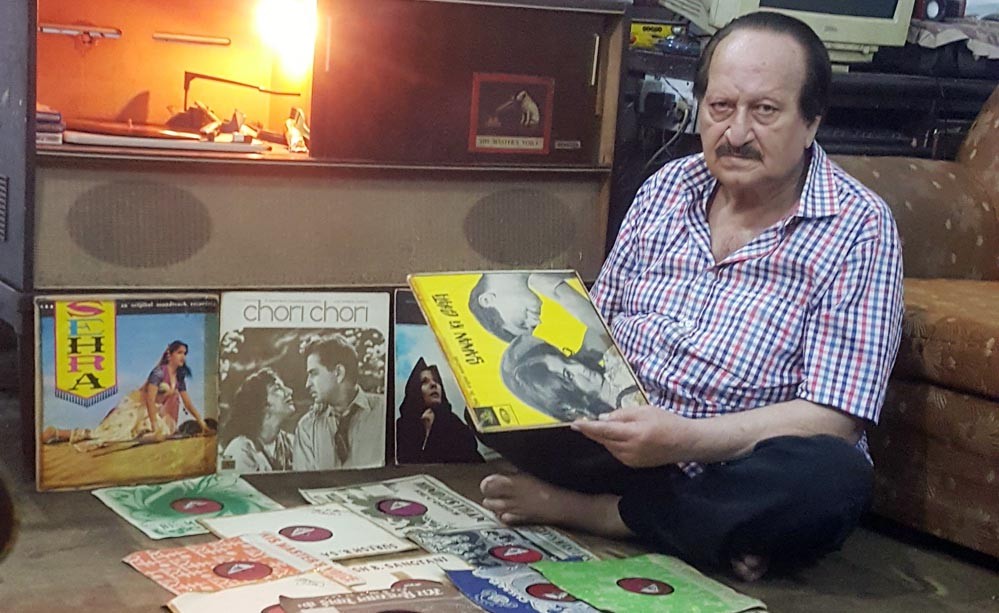
Muhammad Ahmad Khan’s private collection boasts over 7,000 music records

Seventy-year-old Muhammad Ahmad Khan’s favourite pastime is listening to music from the rare collection he has compiled over a period of three decades or so.
In an exclusive chat with TNS, he says that he has got "more than 7,000 vinyl records [78RMP]" which are crammed in a number of cartons in his modestly furnished home in Lahore.
Music buffs often request him for a certain song from some little-known film, and he just whips it out from his mammoth collection.
Khan reveals that as a young man he would listen to the songs that were broadcast on Radio Ceylon, the oldest radio station in Asia. That’s how he got hooked to classical music. He began to collect records in the year 1985. Slowly, it became an obsession with him.
"I didn’t care about my pocket, and would pick up any records that interested me," he says, "and wherever I found them."
He went to India twice, "in search of rare music." His collection swelled in the years to follow.
Having retired from his government job for almost a decade now, Khan devotes all his time and energy to his prized collection. By the way, the hunt is still on, and every once in a while he comes across LPs he didn’t possess.
The old singers whose albums grace his cartons include Para Devi, Zeenat Begum, Mubarak Begum, Nirmala Devi, Surinder Nath, Meena Kapoor, Salochna Kadam, Manna De, Talat Mahmood, Shamshad Begum, Suraiyya, Mohan Tara, Mukesh, Noor Jahan, Humaira Bano, Hemant Kumar, Geeta Dutt, C.H Atma, Khan Mastana, and K.L Saigal. But his all-time favourite remains Lata Mangeshkar. "More than 60 per cent of my collection consists of songs by Lataji," he says, most fondly.
His adulation for one of India’s greatest singers is such that if you name a song of hers, he will instantly tell you the entire history of it.
Khan says that he "tried to meet her during my first visit [to India], but I couldn’t." However, during his last visit, in 1999, he finally got the opportunity.
"An Indian film journalist Bhatt sahib took me to her residence, and requested her to make some time for a Pakistani fan," he recalls. "Lataji’s sister Usha Mangeshkar took us inside the house. Sometime later, Lataji showed up.
"I got this feeling that she was a bit reluctant to talk," he continues. "Seeing camera on my shoulder, she said flatly, ‘No pictures, please!’ But once we started discussing her songs and the ragas used in her songs, she began to take me seriously.
"Our meeting went on for more than two hours. We discussed every aspect of her songs. She was all smiles throughout, and wondering how come a Pakistani knew so much about her songs."
When he was leaving, she requested him to send her the audio cassette of a song [‘Dil toh bata kaisi ghum ki sham hai’] from the film Jashn which she didn’t have. "I came back, copied the song, and sent it to her."
Khan makes a special mention of films such as Shabab, Awara, Uran Khatola, Deedar, Andaz, Dil Ki Basti, Paras, Jeevan Yatra, Aan Baan, Aik Tha Raja, Anand Bhavan, and Maang whose songs he has in his collection. He terms the two decades of 1945 to 65 as the best era, music-wise. Most of the records he has date back to that period.
He also met legendary singer Talat Mehmood and producer-director B.R Chopra during one of his visits to India. He remembers how Chopra got nostalgic about Lahore, as his family used to live on Nisbet Road before partition.
Khan says he felt utterly sad after meeting Mahmood who was seriously ill and had almost lost his voice. "He could hardly say a word. I was in tears seeing the maestro in that condition."
Aside from music records, Khan also has more than 2,000 copies of ‘Filmfare’ magazines from the ‘50s and ‘60s. He takes good care of them, too.